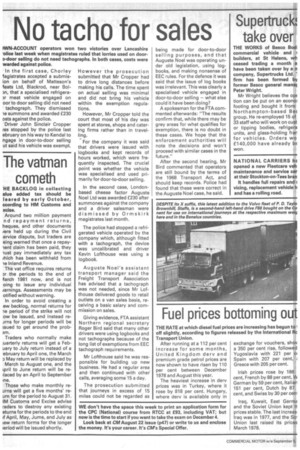No tacho for sales
Page 4

If you've noticed an error in this article please click here to report it so we can fix it.
OWN-ACCOUNT operators won two victories over Lancashire 'olice last week when magistrates ruled that lorries used on dooro-door selling do not need tachographs. In both cases, costs were warded against police.
In the first case, Chorley lagistrates accepted a subrnision on behalf of Matteson's lean Ltd, Blackrod, near Bol)n, that a specialised refrigera)r meat vehicle engaged on oor to door selling did not need tachograph. They dismissed le summons and awarded £230 osts against the police.
Driver John Sinclair Cropper fas stopped by the police last ebruaty on his way to Kendal to ngage in door-to-door selling ut said his vehicle was exempt. However the prosecution submitted that Mr Cropper had to drive long distances before making his calls. The time spent on actual selling was minimal and did not bring his vehicle within the exemption regulations.
However, Mr Cropper told the court that most of his day was spent at stores, shops and catering firms rather than in travelling.
For the company it was said that drivers were issued with logbooks and kept records of hours worked, which were frequently inspected. The crucial point was whether the vehicle was specialised and used primarily for door-to-door selling.
In the second case, Londonbased cheese factor Auguste Noel Ltd was awarded £230 after summones against the company and a driver salesman were dismissed by Ormskirk magistrates last month.
The police had stopped a refrigerated vehicle operated by the company which, although fitted with a tachograph, the device was uncalibrated and driver Kevin Lofthouse was using a logbook.
Auguste Noel's assistant transport manager said the Freight Transport Association has advised that a tachograph was not needed, since Mr Lofthouse delivered goods to retail outlets on a van sales basis, receiving a basic salary and commission on sales.
Giving evidence, FTA assistant Northern regional secretary Roger Bird said that many other drivers were using logbooks and not tachographs because of the long list of exemptions from EEC tachograph requirements.
Mr Lofthouse said he was responsible for building up new business. He had a regular area and then continued with other' calls, averaging some 15 a day.
The prosecution submitted that journeys in excess of 15 miles could not be regarded as
being made for door-to-door selling purposes, and that Auguste Noel was operating under old legislation, using logbooks, and making nonsense of EEC rules. For the defence it was said that the issue of log books was irrelevant. This was clearly a specialised vehicle engaged in door-to-door selling — what else could it have been doing?
A spokesman for the FTA commented afterwards: "The results confirm that, while there may be grey areas for what qualifies for exemption, there is no doubt in these cases. We hope that the enforcement authorities will note the decisions and won't proceed with similar cases in the future."
After the second hearing, Mr Bird commented that operators are still bound by the terms of the 1968 Transport Act, and should keep records. Police had found that these were correct in the Auguste Noel case, he said.








































